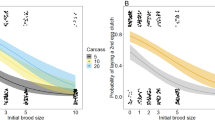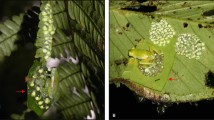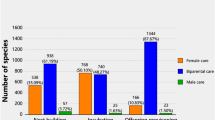Abstract
Parental care is often costly1; hence, in sexually reproducing species where both male and female parents rear their offspring (biparental care), sexual conflict over parental investment can arise2. Such conflict occurs because each care-giver would benefit from withholding parental investment for use with another partner, leading to a reduction in the amount of care given by one parent at the expense of the other3,4,5. Here we report experiments to explore the prediction from theory that parents rearing offspring alone may provide greater parental investment than when rearing offspring together with a partner3,5. We found that when the number of offspring per parent, and hence the potential workload, were kept constant, offspring received a greater per capita parental investment from single females than from both parents working together, and that males reared by single mothers were more sexually attractive as adults than their biparentally reared siblings. This difference between single- and two-parent families is due to a reduction in care provided by females when they care together with a male, rather than laziness by males or differences in the begging behaviour of chicks, supporting the claim that sexual conflict in biparental care can reduce the quality of offspring raised3,5.
This is a preview of subscription content, access via your institution
Access options
Subscribe to this journal
Receive 51 print issues and online access
$199.00 per year
only $3.90 per issue
Buy this article
- Purchase on Springer Link
- Instant access to full article PDF
Prices may be subject to local taxes which are calculated during checkout



Similar content being viewed by others
References
Clutton-Brock, T. H. The Evolution of Parental Care (Princeton Univ. Press, New Jersey, 1991).
Trivers, R. L. in Sexual Selection and the Descent of Man (ed. Campbell, B.) 136–179 (Aldine, Chicago, 1972).
Parker, G. A. Models of parent–offspring conflict .V. Effects of the behaviour of the two parents. Anim. Behav. 33, 519–533 (1985).
Westneat, D. F. & Sargent, R. C. Sex and parenting: the effects of sexual conflict and parentage on parental strategies. Trends Ecol. Evol. 11, 87–91 (1996).
McNamara, J. M., Houston, A. I., Barta, Z. & Osorno, J.-L. Should young ever be better off with one parent than with two? Behav. Ecol. (in the press).
Hurst, L. D., Atlan, A. & Bengtsson, B. O. Genetic conflicts. Q. Rev. Biol. 71, 317–364 (1996).
Godfray, H. C. J. in Levels of Selection in Evolution (ed. Keller, L.) 100–120 (Princeton Univ. Press, New Jersey, 1999).
Lessells, C. M. in Levels of Selection in Evolution (ed. Keller, L.) 75–99 (Princeton Univ. Press, New Jersey, 1999).
Pomiankowski, A. in Levels of Selection in Evolution (ed. Keller, L.) 121–152 (Princeton Univ. Press, New Jersey, 1999).
Chapman, T. & Partridge, L. Sexual conflict as fuel for evolution. Nature 381, 189–190 (1996).
Parker, G. A. & Partridge, L. Sexual conflict and speciation. Phil. Trans. R. Soc. Lond. B 353, 261–274 (1998).
Smith, H. G. & Härdling, R. Clutch size evolution under sexual conflict enhances the stability of mating systems. Proc. R. Soc. Lond. B 267, 2163–2170 (2000).
Rice, W. R. Sexually antagonistic male adaptation triggered by experimental arrest of female evolution. Nature 381, 232–234 (1996).
Stockley, P. Sexual conflict resulting from adaptations to sperm competition. Trends Ecol. Evol. 12, 154–159 (1997).
Birkhead, T. R. & Møller, A. P. (eds) Sperm Competition and Sexual Selection: (Academic, New York, 1998).
Gavrilets, S. Rapid evolution of reproductive barriers driven by sexual conflict. Nature 403, 886–889 (2000).
Moore, A. J., Gowaty, P. A., Wallin, W. G. & Moore, P. J. Sexual conflict and the evolution of female mate choice and male social dominance. Proc. R. Soc. Lond. B 268, 517–523 (2000).
Partridge, L. & Hurst, L. D. Sex and conflict. Science 281, 2003–2008 (1998).
Sasvári, L. Reproductive effort of widowed birds. J. Anim. Ecol. 55, 553–564 (1986).
Bart, J. & Tornes, A. Importance of monogamous male birds in determining reproductive success. Behav. Ecol. Sociobiol. 24, 109–116 (1989).
Wolf, L., Ketterson, E. D. & Nolan, V. Behavioural response of female dark-eyed juncos to experimental removal of their mates: implications for the evolution of parental care. Anim. Behav. 39, 125–134 (1990).
Whittingham, L. A., Dunn, P. O. & Robertson, R. J. Female response to reduced male parental care in birds: an experiment in tree swallows. Ethology 96, 260–269 (1994).
Markman, S., YomTov, Y. & Wright, J. The effect of male removal on female parental care in the orange-tufted sunbird. Anim. Behav. 52, 437–444 (1996).
Mock, D. W. & Parker, G. A. The Evolution of Sibling Rivalry (Oxford Univ. Press, Oxford, 1997).
Lessells, C. M. Parentally-biased favouritism: why should parents specialize in caring for different offspring? Phil. Trans. R. Soc. Lond. B (in the press).
Bennett, A. T. D., Cuthill, I. C., Partridge, J. C. & Maier, E. J. Ultraviolet vision and mate choice in zebra finches. Nature 380, 433–435 (1996).
Smith, C. C. & Fretwell, S. D. The optimal balance between size and number of offspring. Am. Nat. 108, 499–506 (1974).
Chase, I. D. Cooperative and non-cooperative behaviour in animals. Am. Nat. 115, 827–857 (1980).
Houston, A. I. & Davies, N. B. in Behavioural Ecology (eds Sibley, R. M. & Smith, R. H.) 471–487 (Blackwell Scientific, Oxford, 1985).
McNamara, J. M., Gasson, C. E. & Houston, A. I. Incorporating rules for responding into evolutionary games. Nature 401, 368–371 (1999).
Acknowledgements
We thank I. P. F. Owens, L. S. Forbes, C. M. Lessells and J. M. McNamara for comments on the manuscript. The project was funded by the Natural Environment Research Council.
Author information
Authors and Affiliations
Corresponding author
Ethics declarations
Competing interests
The authors declare that they have no competing financial interests
Rights and permissions
About this article
Cite this article
Royle, N., Hartley, I. & Parker, G. Sexual conflict reduces offspring fitness in zebra finches. Nature 416, 733–736 (2002). https://doi.org/10.1038/416733a
Received:
Accepted:
Issue Date:
DOI: https://doi.org/10.1038/416733a
This article is cited by
-
Experimental variation of perceived predation risk does not affect coordination of parental care in long-tailed tits
Behavioral Ecology and Sociobiology (2023)
-
Simultaneous GPS-tracking of parents reveals a similar parental investment within pairs, but no immediate co-adjustment on a trip-to-trip basis
Movement Ecology (2021)
-
Female birds monitor the activity of their mates while brooding nest-bound young
Animal Cognition (2021)
-
Sex bias in parental care is associated with brood age and fledglings’ growth rate in Western Bluebirds Sialia mexicana
Journal of Ornithology (2021)
-
Urban resources limit pair coordination over offspring provisioning
Scientific Reports (2020)
Comments
By submitting a comment you agree to abide by our Terms and Community Guidelines. If you find something abusive or that does not comply with our terms or guidelines please flag it as inappropriate.



